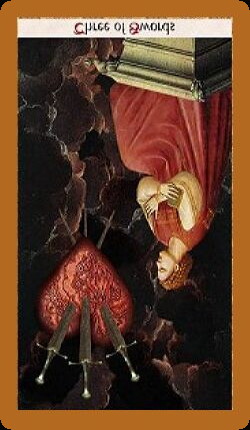Your Chosen Card – Three of Swords Reversed Golden Deck

When reversed, the Three of Swords implies that you are not allowing yourself to grow as a result of your suffering. Rather than hanging on to hard feelings and keeping a dispute going, it may be time to bury the hatchet and clear the air. Clinging too long to rancor and sadness will only result in prolonged heartache. Consider the five stages of grief outlined by Elisabeth Kübler-Ross (1969): (1) denial and isolation, (2) anger, (3) bargaining, (4) depression, and finally (5) acceptance. The Three of Swords is about the process of grieving and ultimately accepting and letting go in order to restore balance in your life (Saturn in Libra).
Keywords Reversed: Stormy weather for the emotions, heartache, breakup, anguish, tears, sadness, loss, grief, sorrow, alienation, lost friendship, miscarriage, death of a loved one, painful separation, rupture, loss of love, divorce, unhappiness, betrayal, a broken heart, distress, affliction, feeling under the weather, illness, quarrels, disruption, interrupted plans, disappointment, wounds, a broken heart, misfortune, suffering.
Timing: 10 Libra20 Libra. Tropical, 3 October12 October. Sidereal, 27 October5 November.
Astrology: The stern taskmaster Saturn (exalted) in the second decan of airy Libra, also the realm of the Queen of Swords (Water of Air) and Justice (Libra). Saturn is linked to the World.
Number Symbolism: 3 – fertility, creativity, a triadic relationship, the first fruits of a joint venture.
Mathers: Separation, removal, rupture, quarrel.
When Three of Swords is reversed you can pretty much take it that life is going well but that’s when life takes us by surprise. If Three of Swords is unclear it may help to choose a card from the Major Arcana to provide more insight into what it is Three of Swords is trying to tell you. If you had a particular issue in mind, or want to seek clarification on something else, you can also choose again to get more guidance.

This chosen card is part of your reversed card reading for Three of Swords using cards from the Golden Tarot Deck. You will find many more tarot pages that will be of great help if you need tarot card meanings. Use the search at the bottom of the page. We have some amazing tarot books for you to browse. Please see below.
Here are some snippets from a few of my favorite books

Book Details
Complete Book of Tarot: The bad vibrations myth: you must cleanse your cards of negative energies by smudging them (passing each card through the smoke of a burning plant such as white sage or lavender).
Complete Book of Tarot: The notorious occultist Aleister Crowley compared learning the tarot to making a new set of friends. Viewing the cards as living individuals, Crowley suggested methods that enable students to form personal relationships with the entities of the tarot. The view of the individual cards as living beings may seem a bit far-fetched, but it is not so different from the Jungian view that the tarot signifies universal archetypes of the collective unconscious.
- Do get in touch if you looked for Three of Swords and we don’t have it listed. We would be more than happy to source the information for you. We hope you visit again for more online tarot information!
Tarot Triumphs: When you are learning Tarot, it’s very possible that you’ll ask friends or people you know if they would like to have their cards read. As time goes on, it’s often better to wait until you’re asked, but of course at the start no one will know that you’re available to do this unless you tell them! And actively offering your services (at the beginning, definitely not for money1) can be a useful way of screening out individuals for whom you don’t feel ready or willing to read the cards. You can also phrase your invitation in such a way that you can tackle the kind of reading you feel most confident with, for instance by saying ‘I’m just getting into practice with this, and I’d like to suggest a general reading as to where things stand at present, if that’s OK.’ Or ‘Could you make it a question that is about something specific, but nothing too important to you?’ This way, you are not dealing with life-or-death situations or opening a can of worms by venturing into very sensitive territory.